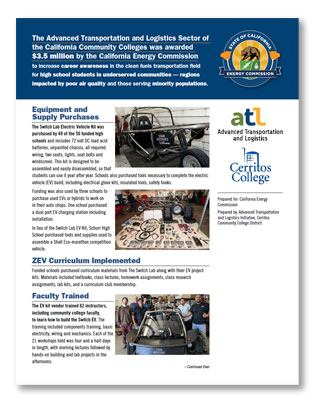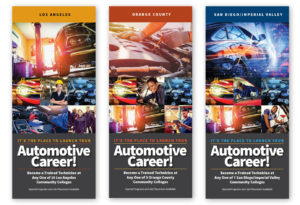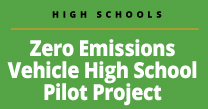 Communities throughout California are suffering from poor air quality and a lack of resources to do something about it. A new partnership between high schools, community colleges, and the California Energy Commission aims to change that.
Communities throughout California are suffering from poor air quality and a lack of resources to do something about it. A new partnership between high schools, community colleges, and the California Energy Commission aims to change that.
The Cerritos Community College District’s Advanced Transportation Technology and Energy Center was awarded $1 million to increase career awareness in the clean fuels transportation field for high school students in underserved communities — regions impacted by poor air quality and those serving minority populations.
Eight high schools are participating in the project. Those confirmed thus far are:
- Artesia High School (Lakewood, CA – Los Angeles/Orange County region)
- Clovis West High School (Fresno, CA — Central Valley region)
- Davis High School (Davis, CA – Greater Sacramento region)
- Gunn High School (Palo Alto, CA – Bay Area region)
- Mira Mesa High School (San Diego, CA)
- Schurr High School (Montebello, CA – Los Angeles/Orange County region)
- Valley High School (Santa Ana, CA – Orange County region)
- Victor Valley High School (Victorville, CA – Inland Empire region)
Funded high school programs will offer clean fuels technology training to students, introduce opportunities to students who may not have considered a career in clean fuels transportation, and encourage interested students to matriculate into well-established community college programs to continue their studies.
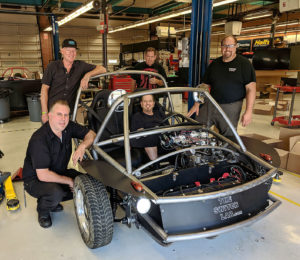 New Equipment, Curriculum and Professional Development
New Equipment, Curriculum and Professional Development
Each high school will receive funding to purchase a Switch electric vehicle kit, which comes with curriculum for teachers to use in their classrooms. High school teachers are also paired with community college instructors from nearby schools who will serve as partners throughout the process.
High school teachers and community college instructors attended a comprehensive train-the-trainer workshop over the summer to receive the instruction they needed to help their students through the assembly process.
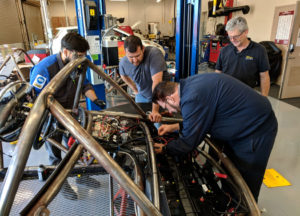 Workshops were held June 11-14 at Saddleback College and August 13-16 at American River College. Each four-day workshop was divided into morning lectures and hands-on time building the Switch vehicles in the afternoon.
Workshops were held June 11-14 at Saddleback College and August 13-16 at American River College. Each four-day workshop was divided into morning lectures and hands-on time building the Switch vehicles in the afternoon.
The vehicle used in the workshop is the same model that students will work on, and the curriculum that the instructors learn is designed to be passed along to students. Marty Supple from Artesia High School attended the training at Saddleback College and found the process easy to follow and the results were well worth the time spent building the vehicle.
“It’s a phenomenal piece of equipment; I love driving it,” Supple said. “Every high school or community college in California or elsewhere should buy one of these vehicles.”
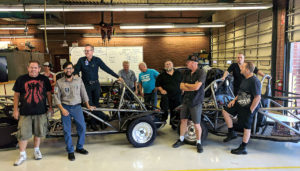 Switch vehicle kits are designed to be a pathway into electric and renewable energy for teachers who are used to working on traditional vehicles. The company is based in Sebastopol and works with schools across the U.S.
Switch vehicle kits are designed to be a pathway into electric and renewable energy for teachers who are used to working on traditional vehicles. The company is based in Sebastopol and works with schools across the U.S.
Teachers who were initially hesitant about building electric vehicles end up becoming advocates for the technology and the Switch training process.
“We realized that teachers like to teach what they’ve been taught,” said Switch co-founder Peter Oliver.
Energy Commission Support
Through this project, and the recently completed Community College Alternative Fuel and Vehicle Technology Training Enhancement Program the Advanced Transportation and Logistics (ATL) Sector of the California Community Colleges will continue its work to grow and strengthen clean fuel transportation programs that prepare new workers for careers in this field, and train incumbents on the latest technologies.
“The Energy Commission’s support of these programs makes it possible for us to increase our reach across the state,” said Jannet Malig, ATL Statewide Director. “The high school students we bring into our clean fuels transportation pathways will be well prepared for jobs in this growing field.”
For more information about The SWITCH Lab please visit www.theswitchlab.com or contact Switch Vehicles at info@switchvehicles.com.


